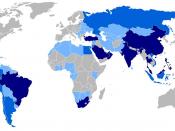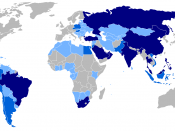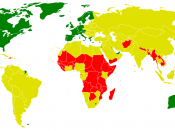Women in the developed world enjoy a wide range of opportunities and receive the protection of Human Rights laws. However, women in the developing world often have their rights ignored or violated. They are disadvantaged in all aspects of their lives, including their work, their legal status, their health, and even their freedom.
Usually women must juggle their paid jobs with domestic duties such as caring for children, tending to crops and livestock and housekeeping. Women in rural areas may have to undertake even more work if their husbands choose to move to the city to find other jobs, or as a result of increased technology. For example, fertiliser improves the quantity of crops grown, but it also increases the amount of weeds, so the women must spend even more time weeding. This is extremely hard labour. Domestic and agricultural work is unpaid and so, added up, while women are doing over half the world's work, they obtain only one-tenth of the world's pay.
In the developed world, people have even more advanced technology, which can further reduce the input of work required. Men and women also share jobs equally and work together; and even in some cases, men are learning to take on their share of domestic duties.
Women perform the vast majority of work in the world, almost two thirds of it. Women in developing countries often work long hours, as there are no laws such as the 8-hour-day rule. They may work from dawn to dusk, sometimes for even longer. In an urban area, women are also oppressed. City women are most likely to find work in the informal sector - where they do not pay taxes. In many newly-industrialising countries such as South Korea and Thailand, the percentage of women in the manufacturing workforce is...



Women's Rights
I'm appreciative of your very good essay on how women in developing countries frequently have their rights ignored or violated. There's nothing developed, or even developing, about the practices you describe which are appalling. The human rights abuses directed against women and girls cry out for reform. Your last sentence of the essay was powerful and bears reiterating. I share your hope that one day "women will be able to chart their own futures and wield the power to be what they are." Let's hope it happens soon and do what we can to help bring that day about.
9 out of 9 people found this comment useful.